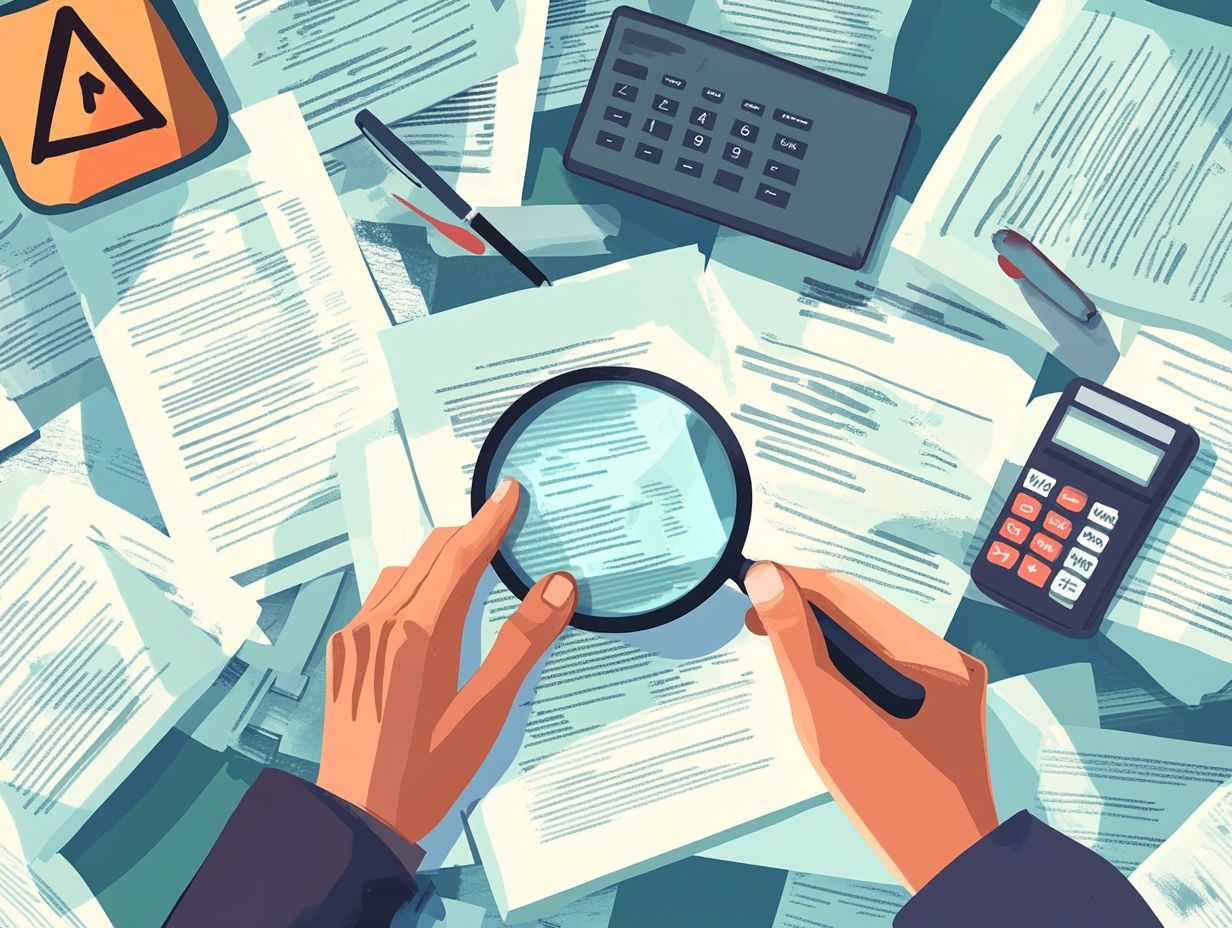How to Identify Financial Scams?
In today s digital landscape, financial scams have evolved into increasingly sophisticated threats. It is crucial for you to remain informed.
By grasping the diverse range of scams from phishing schemes to investment fraud you can better recognize the tactics employed by scammers. Identifying red flags and understanding how to safeguard yourself can dramatically lower your risk.
This article will navigate you through the realm of financial scams, providing valuable insights on how to avoid them, recover from any incidents, and maintain vigilance moving forward.
Contents
- Key Takeaways:
- Unlocking the Secrets of Financial Scams
- Types of Financial Scams
- Signs of a Financial Scam
- Protecting Yourself from Scams
- Recovering from a Financial Scam
- Preventing Future Scams
- Frequently Asked Questions
- 1. How do I know if an investment opportunity is a financial scam?
- 2. What are some red flags to look out for when trying to identify a financial scam?
- 3. Can I spot a financial scam by checking the company’s website?
- 4. Are there any government resources I can use to help identify financial scams?
- 5. What should I do if I suspect I have been a victim of a financial scam?
- 6. Can I protect myself from financial scams in the future?
Key Takeaways:

- Be aware of what financial scams are and how they work to protect yourself from falling victim.
- Look out for common red flags such as unsolicited offers, pressure to act quickly, and requests for personal information or payment.
- Take steps to prevent future scams by staying informed, verifying information, and reporting any suspicious activity.
Unlocking the Secrets of Financial Scams
Knowing about financial scams is your best defense! It is essential in today s intricate economic landscape, where deceptive practices like financial statement fraud can have devastating repercussions.
These scams often take advantage of ways to get around the rules, enabling unscrupulous actors to manipulate earnings and misrepresent financial health. This ultimately erodes stakeholder trust.
High-profile cases like Enron’s accounting fraud serve as stark reminders of how corporate deception can obliterate investor confidence. It can disrupt cash flows and even lead to bankruptcy.
As technology advances, tactics of deception also evolve. It is crucial for you, whether as a consumer or within a financial institution, to recognize the warning signs of scams, including phishing attempts and identity theft.
What are Financial Scams?
Financial scams are deceptive practices designed to mislead you or your organization for personal gain. They can take various forms, including corporate fraud and asset misappropriation. These often result in significant financial losses for investors, tarnishing the reputation of the corporations involved.
These schemes can appear in many guises, such as Ponzi schemes, phishing scams, and insider trading. They specifically target unsuspecting individuals or na ve businesses. The motivations behind these scams typically stem from greed, desperation, or the allure of easy money. Perpetrators are driven to exploit trust and vulnerability.
You may find that typical targets include retirees seeking stable investments, small business owners in search of growth opportunities, and even large corporations that can fall victim to sophisticated tactics.
The ripple effect of these scams is profound. Not only do they lead to financial ruin for individuals, but they also shake the very foundation of market integrity, fostering skepticism and fear among potential investors.
Types of Financial Scams
Numerous financial scams lurk in the shadows, each meticulously crafted to exploit trust and the vulnerabilities of individuals and organizations alike. They often culminate in dire financial repercussions.
Consider Ponzi schemes, for instance. Returns are cunningly paid to earlier investors using the capital from newcomers, creating an illusion of profitability that inevitably crumbles.
Investment scams also abound, luring individuals with promises of unrealistic returns, frequently resulting in significant financial loss.
Additionally, consumer scams, email fraud, and social media deception have surged alongside our increasing digital interactions. They prey on unsuspecting victims through cleverly deceptive tactics.
Stay alert! Knowledge is your power against financial scams!
Common Scams and How They Work
Scams like Ponzi schemes and investment fraud often lure you in with promises of extraordinary returns. They cleverly use deceptive tactics and fraudulent practices to mislead you. Understanding how these scams operate is essential for protecting your personal and organizational finances.
Many scams thrive on emotional manipulation, preying on your dreams of financial security and success. A notorious example is the Bernie Madoff Ponzi scheme, which falsely assured investors of consistent, high returns while using funds from new investors to pay off earlier ones.
Fake investment opportunities in crypto-assets often create a sense of urgency and exclusivity. This pressure makes potential victims act quickly to avoid missing out on what they claim are ‘once-in-a-lifetime’ opportunities. By recognizing red flags like unsolicited offers or high-pressure tactics and conducting thorough research before investing, you can significantly reduce your risk of falling victim to these fraudulent schemes.
Signs of a Financial Scam

Recognizing the signs of a financial scam is crucial for both individuals and corporations to protect against potential financial losses and investor deception.
Watch for common red flags, such as:
- Unsolicited contact
- Promises of high returns with minimal risk
- Noticeable absence of transparent financial reporting
These are all indicators of the deceptive tactics often used by fraudsters.
Red Flags to Look Out For
When assessing the legitimacy of financial opportunities, be vigilant for several red flags. Unsolicited offers, pressure tactics, and a lack of verifiable information can all indicate potential scams. Recognizing these signs can significantly enhance your fraud prevention efforts.
A common scenario involves receiving a random email or phone call that promises high returns with minimal risk. These unsolicited offers often come with aggressive sales tactics, pushing you to make quick decisions without enough time for proper research.
If detailed information is hard to find or the promoter becomes evasive when you request documentation, it s time to raise your eyebrows and proceed with caution.
It s wise to conduct background checks and seek second opinions before moving forward. Taking these proactive steps can help protect your finances from potential deception.
Protecting Yourself from Scams
Stay alert to protect yourself from financial scams! Proactive strategies are essential to thwart potential fraud attempts, especially in today s digital landscape where scams are all too common.
By following rules you must follow and staying informed about prevalent fraud tactics, you can significantly reduce your risk exposure and safeguard your financial well-being.
Tips for Avoiding and Reporting Scams
To effectively avoid and report financial scams, familiarize yourself with key warning signs and engage in proactive fraud prevention practices. If you notice any suspicious activities, it s crucial to report them to the relevant authorities. Timely reporting can significantly mitigate potential losses.
Stay informed about common tactics employed by scammers, like phishing emails and unsolicited phone calls. Encourage open discussions within your community about these threats; collective vigilance makes it harder for scammers to succeed.
Utilize resources such as the Federal Trade Commission’s website or your local consumer protection agencies. These provide valuable information and tools for reporting scams. By sharing experiences and maintaining awareness, you help create a safer environment for everyone. Don t let yourself be a victim stay informed and act!
Recovering from a Financial Scam
Recovering from a financial scam is a serious challenge. You must navigate a landscape filled with complex emotional and money problems, including significant losses and the need to report the fraud.
Understand the steps involved in this recovery journey. Engage with federal authorities and use effective investigation techniques to regain your footing.
Steps to Take for Recovery

Take action now to tackle both the emotional and financial aftermath! Start by documenting all communications and reporting the fraud to the relevant authorities. Engaging with support networks can significantly aid in your emotional recovery.
Once you’ve taken those initial steps, reach out to your financial institutions to freeze any affected accounts and explore recovery options. Create a detailed timeline of events this documentation can assist authorities in their investigations and may help dispute unauthorized charges.
Connect with organizations like the Federal Trade Commission (FTC) or local consumer protection agencies. They can offer valuable guidance and resources. Also, seek support from counseling services to process feelings of anxiety and betrayal, ensuring a well-rounded recovery that addresses both financial and emotional impacts.
Preventing Future Scams
Preventing future scams requires a comprehensive strategy. Highlight the importance of awareness, education, and strong data security measures to protect against identity theft and financial crimes.
Stay informed about the latest scams and implement proactive fraud prevention techniques to reduce your risk and enhance your security.
How to Stay Safe from Scammers
Staying safe from scammers demands a proactive mindset. Commit to educating yourself about common fraud prevention strategies and warning signs tied to financial scams. Regularly update your security measures and be cautious with unsolicited contacts.
Use strong, unique passwords for your accounts and enable two-factor authentication, a security method where you need to provide two forms of identification to access your account. A password manager can help you securely manage multiple credentials and reduce the temptation to reuse passwords.
Keep a close eye on your bank and credit card statements for unfamiliar transactions. Engage in security awareness training whether through online courses or community workshops to sharpen your ability to spot phishing emails or suspicious phone calls.
Finally, keep your software and antivirus programs updated. This is essential for protection against the latest threats and helps safeguard your personal data.
Frequently Asked Questions
1. How do I know if an investment opportunity is a financial scam?
Research the company or individual offering the investment. Ensure they are licensed and registered with the appropriate regulatory bodies. Be wary of promises of high returns with little risk, as this is a common tactic used by scammers.
2. What are some red flags to look out for when trying to identify a financial scam?

Watch for pressure to act quickly, unsolicited offers, and promises of guaranteed returns. Scammers often use these tactics to create a sense of urgency and lure in victims.
3. Can I spot a financial scam by checking the company’s website?
A legitimate company typically has a professional and up-to-date website, but scammers are becoming increasingly skilled at creating convincing websites. Do thorough research beyond just the company’s site before making any financial decisions.
Don t wait! Take charge of your financial safety today!
4. Are there any government resources I can use to help identify financial scams?
Yes, there are several resources available through government agencies such as the Securities and Exchange Commission (SEC) and the Federal Trade Commission (FTC). These agencies provide information on common types of financial scams and how to avoid them.
5. What should I do if I suspect I have been a victim of a financial scam?
If you believe you have fallen victim to a financial scam, it is important to act quickly. Contact your bank or financial institution and report the scam to the appropriate authorities, such as the local police or the FTC.
6. Can I protect myself from financial scams in the future?
While there is no foolproof way to avoid all financial scams, there are steps you can take to protect yourself. These include:
- Being cautious of unsolicited offers,
- Thoroughly researching any investment opportunities,
- Staying informed about common scams and how to spot them.





